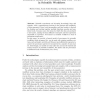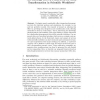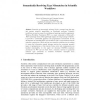ESCIENCE
2006
IEEE
14 years 6 months ago
2006
IEEE
We view scientific workflows as the domain scientist's way to harness cyberinfrastructure for e-Science. Domain scientists are often interested in "end-to-end" fram...
DILS
2006
Springer
14 years 6 months ago
2006
Springer
Scientific experiments are becoming increasingly large and complex, with a commensurate increase in the amount and complexity of data generated. Data, both intermediate and final r...
DILS
2004
Springer
14 years 6 months ago
2004
Springer
Abstract. Ecologists spend considerable effort integrating heterogeneous data for statistical analyses and simulations, for example, to run and test predictive models. Our research...
ESCIENCE
2007
IEEE
14 years 7 months ago
2007
IEEE
Scientific workflows have recently emerged as a new paradigm for representing and managing complex distributed scientific computations and data analysis, and have enabled and acce...
OTM
2007
Springer
14 years 9 months ago
2007
Springer
Scientists are increasingly utilizing Grids to manage large data sets and execute scientific experiments on distributed resources. Scientific workflows are used as means for modeli...
ESCIENCE
2007
IEEE
14 years 9 months ago
2007
IEEE
As scientific workflows and the data they operate on, grow in size and complexity, the task of defining how those workflows should execute (which resources to use, where the resou...
SC
2009
ACM
14 years 10 months ago
2009
ACM
One of the main advantages of using a scientific workflow management system (SWfMS) to orchestrate data flows among scientific activities is to control and register the whole work...
SIGMOD
2006
ACM
15 years 3 months ago
2006
ACM
Scientific WorkFlows (SWFs) need to utilize components and applications in order to satisfy the requirements of specific workflow tasks. Technology trends in software development ...






